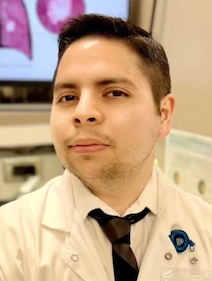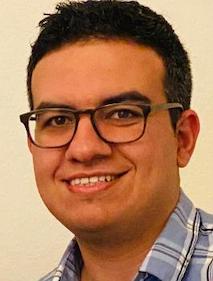Each year, LCRF awards research grants to around the world that demonstrate promise and ingenuity in their work. These investigators, selected from hundreds of applicants, represent some of the brightest minds committed to improving outcomes for lung cancer patients. Coming from various career paths including scientists, physicians, students, and fellows, and working on a variety of innovative research projects related to lung cancer, we are proud to include them in our portfolio of currently funded projects, which you can learn more about below. View our full portfolio of previously funded research here.
2023 LCRF–Daiichi Sankyo–AstraZeneca Research Grant on Antibody Drug Conjugates
Aakash Desai, MD, MPH
University of Alabama at Birmingham
RESEARCH PROJECT:
Deciphering the ADC Code: A Proteogenomic Quest in Lung Cancer
SUMMARY:
This research project aims to improve the treatment of Non-Small Cell Lung Cancer (NSCLC) using a special kind of therapy called Antibody-drug conjugates (ADCs). These therapies are designed to target cancer cells more precisely. However, it’s not fully understood why some patients respond better to these treatments than others. The focus of this project is to study a particular target on cancer cells, known as Trop-2, and to figure out how its presence or absence affects the success of the therapy. By examining the characteristics of cancer cells and their surrounding environment in great detail, the project hopes to find out which patients are more likely to benefit from ADCs. This could lead to more personalized and effective treatments for lung cancer.

Carl Gay, MD, PhD
University of Texas M.D. Anderson Cancer Center
RESEARCH PROJECT:
Pulmonary high-grade neuroendocrine carcinomas as indications for antibody-drug conjugates targeting TROP2 and HER2
SUMMARY:
Small cell lung cancer (SCLC) and large-cell neuroendocrine carcinoma (LCNEC) are similarly aggressive lung cancers with poor prognosis due, in part, to limited personalized treatment options. Preliminary data demonstrate that TROP2 and HER2 are viable targets for treatment of these malignancies if the correct patients are selected. Antibody-drug conjugates targeting TROP2 and HER2 rely upon both expression of the antibody’s target and sensitivity to the drug to which the antibody is conjugated – each of which is heterogeneous in SCLC and LCNEC. This proposal highlights a strategy to delineate the precise patient population to which to apply these agents making use of an unparalleled collection of patient samples and patient-derived models for validation.

Nan Sethakorn, MD, PhD
Loyola University of Chicago
RESEARCH PROJECT:
Leveraging liquid biopsy to identify the optimal clinical niche for Trop2-targeting in NSCLC
SUMMARY:
A new class of treatments in lung cancer are antibody-drug conjugates (ADCs) that work by detecting proteins on cancer cells. One target is Trop2, a protein found in many cancer cells. Trop2-ADCs show promising anti-tumor activity, but treatments often stop working, or do not work in everyone. Often, as patients receive treatments, their tumors develop changes that allow them to adapt, but often it is difficult to get a sample. New technologies that can analyze tumor cells circulating in blood are thus a way to obtain a “liquid biopsy” through a simple blood draw. This project will study three markers: Trop2, PD-L1, and schlafen-11, in circulating tumor cells, and may identify patients who may benefit from Trop2-ADCs either alone or in combination with currently existing immunotherapy.

2023 LCRF Leading Edge Research Grant Program
2023 William C. Rippe Award *
Francisco Expósito, PhD
Yale University
RESEARCH PROJECT:
Investigating novel synthetic lethal vulnerabilities in EGFR-driven lung cancer
*This project was awarded the LCRF William C. Rippe Award for Distinguished Research in Lung Cancer, acknowledging the investigator whose proposal not only demonstrated exceptional scientific merit but also exemplified an enduring commitment to making an impact in the field of lung cancer research.
SUMMARY:
Lung cancers driven by mutations in EGFR represent between 15-60% of lung adenocarcinomas. The presence of EGFR mutations predicts the response to specific therapies referred to as tyrosine kinase inhibitors (TKIs). Although these inhibitors have revolutionized the way we treat this type of cancer, patients have varied responses and eventually, all tumors will become resistant and stop responding, highlighting the need for alternative treatment options.
In this project, we aim to understand how the loss of SETD2 hinders EGFR-driven tumor growth to leverage these findings to create new precision treatments for the treatment of patients with EGFR-mutant tumors.
“I am really honored to receive the William C. Rippe Award for Distinguished Research in Lung Cancer from the Lung Cancer Research Foundation. Thanks to the support from LCRF we hope to uncover novel genetic vulnerabilities of EGFR-driven lung tumors and leverage these findings to implement and inform new precision-based treatments for this type of tumors in the future.”

Benjamin Morris, PhD
University of Texas M.D. Anderson Cancer Center
RESEARCH PROJECT:
Deep whole genome sequencing of circulating tumor DNA for studying evolution and therapy resistance in small cell lung cancer
SUMMARY:
While most small cell lung cancers (SCLCs) initially respond to a combination of chemotherapy and immunotherapy, resistance often develops quickly. It is currently unknown how these cancers evolve to escape standard of care treatment. In this project, we will use cancer DNA collected from small blood draws to study how SCLC evolves following treatment. Our work will identify changes in cancer DNA and gene expression that drive resistance. We will also determine if resistant tumors are composed of one population of resistant cells or if multiple, hard to treat populations emerge after treatment to drive resistance. By identifying how SCLC cells change following initial treatment, our work will help identify new ways to better treat resistant SCLC in the clinic.

2023 LCRF Research Grant on Understanding Resistance in Lung Cancer
Trever G. Bivona, MD, PhD
University of California San Francisco
RESEARCH PROJECT:
Characterization and therapeutic targeting of a tumor-tumor microenvironment network promoting resistance to targeted therapy in lung cancer
SUMMARY:
The overall goal we aim to achieve in this project is to create an entirely new approach to treat lung cancer by developing a suite of precision therapies that are distinct in their mechanism of action against the tumor ecosystem and improve the effectiveness of current therapies against mutant EGFR, KRAS, and ALK as combination therapies, while critically maintaining safety and quality of life for patients. The work accomplished in this project could yield molecular treatments that better control, or potentially cure, lung cancer safely through improved precision medicine in the relatively near future.

Ann Pendergast, PhD
Duke University School of Medicine
RESEARCH PROJECT:
Uncovering novel vulnerabilities to treat SCLC therapy resistance
SUMMARY:
Small cell lung cancer (SCLC) is a highly aggressive neuroendocrine lung cancer that is typically metastatic upon diagnosis. The overall 5-year survival rate for SCLC patients is only ~7%, and has remained unchanged for over 30 years. Therefore, there is an urgent need to define the molecular mechanisms that promote metastatic SCLC in order to identify effective treatment strategies to treat this deadly cancer. The Pendergast laboratory recently found that pharmacologic inhibition of ABL kinases with ABL-specific inhibitors impairs SCLC metastasis in mouse models, resulting in prolonged animal survival. This proposal will evaluate whether ABL kinase inhibition sensitizes SCLC to therapies targeting stress response pathways, and/or to metabolic inhibitors.

2023 LCRF Minority Career Development Award (CDA) in Lung Cancer
2023 James B. Dougherty, MD Award **
Lloyd Bod, PhD
Massachusetts General Hospital
RESEARCH PROJECT:
Harnessing B cell specific checkpoint molecules in lung cancer
**This project was awarded the James B. Dougherty, MD Award for Scientific Merit acknowledging the investigator whose proposal was selected for outstanding overall merit by LCRF’s Scientific Advisory Board.
SUMMARY:
Immunotherapy has transformed the paradigm of lung cancer treatment, yet its efficacy remains restricted, benefiting only a minority of patients—typically, two to four individuals out of every ten. Dr. Bod’s research focuses on unraveling the functions of B cells, a critical component of the immune system. These cells are abundant in lung tissue and hold the capacity to assist T cells in their anti-cancer activities while directly combatting cancer cells themselves. This translational project’s objective is to leverage genomics to identify and assess new molecules present on B cells, which could serve as innovative immunotherapy targets, thereby paving the way for new therapeutic strategies in lung cancer.
“This award fuels our quest to explore B cells in lung cancer, aiming to unlock groundbreaking treatments. I’m deeply grateful for the recognition.”

Luis Prieto, PhD
Mayo Clinic
RESEARCH PROJECT:
Impact of senescent cells on lung tumorigenesis
SUMMARY:
Dr. Prieto is studying naturally occurring senescent (aging) cells to determine if they promote late-life development of lung cancer. Aging cells accumulate and promote the development of lung tumors by suppressing immune T cells. He will then use treatments aimed at killing senescent cells to see if this effects the formation and/or growth of tumors.

2023 LCRF Research Grant on Early Detection and Pre-Neoplasia in Lung Cancer
Darren Chiu, MD, MMSc
Boston University
RESEARCH PROJECT:
The Spatial B Cell Landscape in Lung Squamous Premalignant Lesions
SUMMARY:
Bronchial premalignant lesions (PMLs) develop in the airway from cellular and molecular changes, and they are precursor lesions of lung squamous cell carcinoma. While some PMLs progress to cancer, some of them regress spontaneously or remain stable. The presence and distribution of B cells in lung cancer has been associated with prognosis and survival, however, the role of B cells in the lung premalignancy is poorly understood. Using single cell sequencing technology and multiplex multiomic imaging, we will identify B cell subpopulations in bronchial PMLs and characterize the spatial microenvironment that recruits and modulates B cells associated with PMLs severity and progression. The findings are expected to reveal new biomarkers for early diagnosis or interception of lung cancer.

2022 LCRF Pilot Grant Program
Huanhuan Chen, PhD
The University of Chicago
RESEARCH PROJECT:
A human pluripotent stem cell-based approach to metastasis of small cell lung cancer
SUMMARY:
Small cell lung cancer (SCLC) is one of the most lethal human malignancies, which has remarkable metastatic propensity among all solid tumors. However, the biological principles of SCLC metastasis remain poorly understood. In this project, we will harness innovative methods and tools, the SCLC models derived from human pluripotent stem cells (hPSCs) that can be characterized at the single-cell level, to pursue the long-standing mysteries about SCLC metastasis. By interrogating the behaviors of the cells in the paired primary tumors and metastases in the hPSC-derived SCLC model, we are able to identify novel cellular, genetic, and molecular mechanisms counting for the highly metastatic potential of SCLC. Our findings are expected to generate new ideas about diagnosis or therapy for this recalcitrant cancer.

Bingnan Zhang, MD
University of Texas MD Anderson Cancer Center
RESEARCH PROJECT:
Harnessing DLL3 as a CAR T target in small cell lung cancer
SUMMARY:
Small cell lung cancer (SCLC) is a highly aggressive type of lung cancer with limited therapeutic options. Chimeric antigen receptor (CAR) T-cell therapy a “living”, personalized drug, that modifies a patient’s own immune cells to target and kill cancer cells. Dr. Zhang and her team have developed a novel CAR T against a SCLC surface protein target DLL3. In this project, Dr. Zhang and her team will investigate the efficacy of the DLL3 CAR T and its potential resistance mechanisms in patient-derived mouse models. The goal of this research is to ultimately inform the design of clinical trials using DLL3 CAR T and its combination approaches to benefit patients with SCLC.

2022 LCRF Minority Career Development Award (CDA) in Lung Cancer
Amanda Iris Bradley, PhD
Fred Hutchinson Cancer Center
RESEARCH PROJECT:
Discovering genetic factors of MET Exon skipping and drug resistance in lung cancer
SUMMARY:
In lung adenocarcinomas, 3-5% of tumors possess MET mutations. MET, is involved in activation of signaling pathways that regulate growth and mutations can result in prolonged MET activation leading to cancer development. Splicing errors can lead to MET exon-14 skipping, resulting in a hyper-active MET. While exon 14-deleted MET is a validated clinical target and FDA approved inhibitors are in use, development of resistance is common. Using genome editing technology, this study will generate the first ever atlas of MET exon 14 skipping variants, aiding in interpretation of clinical MET data. In addition, novel MET inhibitor resistance mechanisms will be identified with the goal of identifying combination therapies to overcome resistance to MET-targeted therapy.

Carla Concepcion, PhD
Columbia University Irving Medical Center
RESEARCH PROJECT:
Targeting SMARCA4-deficient lung cancers
SUMMARY:
SMARCA4 alterations occur in 10% of NSCLC, are associated with poor patient outcomes, but have yet to lead to targeted therapies. SMARCA2 has emerged as a promising therapeutic target in SMARCA4-mutant lung cancers. SMARCA4 inactivation results in a dependence on SMARCA2 for cells to proliferate; thus, small molecules against SMARCA2 have been developed. Yet, the existence of highly aggressive lung cancers deficient for both SMARCA4 and SMARCA2 demonstrates that dual loss can be tolerated by proliferative cancer cells. In this project, Dr. Concepcion and her group will (1) determine the precise roles of SMARCA2 in the progression of SMARCA4-deficient lung cancers and (2) identify the molecular mechanisms that permit cells to proliferate in the absence of both SMARCA4 and SMARCA2.

2022 LCRF Research Grant on Early Detection and Pre-Neoplasia in Lung Cancer
Mohammad Shahrokh Esfahani, PhD
Stanford University
RESEARCH PROJECT:
Noninvasive prediction of local recurrence in localized NSCLCs after CRT
SUMMARY:
Nearly half of non-small cell lung cancer patients are diagnosed with localized disease, making them candidates for chemoradiotherapy (CRT) as curative treatment. Among these, CRT is the main treatment for stage III patients, of whom, ~30% will experience local recurrence. Despite advances utilizing tumor imaging techniques to improve targeting, no further personalization is done based on tumor biology to refine radiation strategy. Therefore, relevant biomarkers to predict treatment outcome to guide and adapt CRT are lacking. We propose to address this problem by profiling cell-free DNA using state-of-the-art techniques to infer RNA expression from DNA, and thereby identify determinants of response to CRT. We envision that this noninvasive technique will help radiation personalization.

Tim Lautenschlaeger, MD
Indiana University
RESEARCH PROJECT:
24-hour urine based ctDNA analysis for early stage NSCLC detection
SUMMARY:
Imagine giving your doctor a urine sample to determine if you have lung cancer. Researchers at the Indiana University School of Medicine could make that idea a reality with a grant from the Lung Cancer Research Foundation. Urine samples from lung cancer patients and individuals at high risk of developing lung cancer will be tested for circulating tumor DNA, a form of DNA found only in cancer patients. While blood tests can be used to detect circulating tumor DNA, the amount in blood is too low for them to be useful in cancer screening. Urine has been shown to contain far larger amounts of circulating tumor DNA and is safer and easier to collect. If successful, this urine-based cancer screening test could make looking for lung cancer easier and encourage more people to get screened.

2022 LCRF–ALK Positive Research Grant
Jaime Schneider, MD, PhD
Massachusetts General Hospital
RESEARCH PROJECT:
Metabolic reprogramming as a driver of resistance in ALK+ lung cancer
SUMMARY:
Dr. Schneider is a thoracic oncologist and biomedical research who is using integrative metabolomics approaches to study lung cancer biology. She was awarded the 2022 ALK Positive Lung Cancer Research Award for her work on identifying novel mechanisms of therapeutic resistance based on tumor metabolic rewiring. Using patient-derived cell lines, orthotopic mouse models, and tumor specimens, the overall goal is to elucidate metabolic vulnerabilities in ALK+ lung cancer that may prove to be targetable for therapeutic intervention. Using state-of-the-art technologies to probe tumor metabolism, Dr. Schneider hopes to identify a new paradigm of resistance in ALK+ lung cancer in which modulation of metabolism is a clinically actionable lung cancer treatment.
Dr. Schneider’s work was published in Nature Cancer, Feb. 16, 2023.

Álvaro Quintanal Villalonga, PhD
Memorial Sloan-Kettering Cancer Center
RESEARCH PROJECT:
Identifying epigenomic mechanisms of ALK TKI resistance
SUMMARY:
ALK inhibitors are very effective in the treatment of ALK fusion-positive tumors, but these eventually develop resistance to therapy. Understanding how tumors become resistant is key to identify subsequent therapeutic approaches that will extend treatment efficacy. Most of what we know about treatment resistance in this setting is limited to how some of these tumors develop other changes in the ALK gene itself or other genes (mutations). However, other tumors may become resistant through a different way, by undergoing major shifts in which genes are active (“epigenetic” changes). We seek to characterize these changes and develop new therapeutic strategies for those patients with ALK fusion-positive lung cancers whose tumors develop this type of resistance.

2022 LCRF and MET Crusaders Research Grant on MET-Driven Lung Cancer
Timothy Burns, MD, PhD
University of Pittsburgh
RESEARCH PROJECT:
Targeting glycolysis in MET altered lung cancer brain metastases
SUMMARY:
Lung adenocarcinoma (LUAD) has the highest incidence of brain metastases (BM) with almost 40% of lung cancer patients developing BM during the course of their disease. As there are no targeted therapies for the treatment of LUAD-BM, the development of novel treatments to effectively prevent and treat LUAD-BM is urgently needed to improve patient survival. Our preliminary studies suggest that alterations in the MET gene are selected for in metastatic lesions to the brain, and that the MET pathway may be a therapeutic target for LUAD-BM. In this project, we will define the metabolic vulnerabilities of MET altered NSCLC BM and provide the preclinical rationale to test whether metabolic inhibitors could be effective in a significant subset of LUAD BM patients (~20%) in the clinic.

2022 William C. Rippe Award **
Emiliano Cocco, PhD
Miller School of Medicine of the University of Miami
RESEARCH PROJECT:
Exploring novel therapeutic options to target MET-driven lung cancers
* * This project was awarded the LCRF William C. Rippe Award for Distinguished Research in Lung Cancer, acknowledging the investigator whose proposal not only demonstrated exceptional scientific merit but also exemplified an enduring commitment to making an impact in the field of lung cancer research.
SUMMARY:
MET alterations are recurrent drivers in Non-Small-Cell lung cancer (NSCLC). While most anti-MET agents are active, resistance develops. Identifying more effective approaches to target MET-driven NSCLCs is an unmet need. Here, we aim to 1) parallel the clinical development of a new anti-MET Antibody-Drug-Conjugate (ADC) with its pre-clinical characterization, 2) evaluate the efficacy of MET inhibitors with different binding modes (type I and II agents) against MET mutant NSCLCs and, 3) unveil mechanisms of resistance to these therapies. Successful completion of this proposal will provide insights into the activity of a new MET ADC, as well as of type I and II MET inhibitors. Moreover, it will reveal possible mechanisms of resistance to these agents, potentially suggesting new therapies.
Dr. Cocco’s work was published in Nature Reviews Clinical Oncology, Feb. 20, 2023.

Xiuning Le, MD, PhD
University of Texas MD Anderson Cancer Center
RESEARCH PROJECT:
Optimization of MET-CAR-T/NK cell-based therapies for MET exon 14 skipping NSCLC
SUMMARY:
Chimeric antigen receptor (CAR) based cell therapy is a way to get immune cells, either T cells or NK cells to fight cancer by changing them in the lab so they can find and kill cancer cells. CAR-T cell therapies have been approved by FDA in lymphoma, but it is still slow in the solid tumor arena. For METex14 skipping and MET overexpressed lung cancer, CAR T/NK approach is particularly promising as MET antibody-based therapies have shown good clinical results. Here, we will first test if CAR T/NK cells can effectively kill METex14 tumor cells in vitro and in mouse models. Next, we will evaluate combinations to enhance the efficacy of MET targeting CAR T/NK cells, aiming to produce benefit in cancers having low- or moderate-MET levels, which can benefit more lung cancer patients.

2022 LCRF and EGFR Resisters Research Grant on EGFR-Driven Lung Cancer
2022 James B. Dougherty, MD Award*
Swarnali Acharyya, PhD
Columbia University Medical Center
RESEARCH PROJECT:
Drugging the S100A9-Retinoic acid pathway: companion biomarker and therapy
* This project was awarded the James B. Dougherty, MD Award for Scientific Merit acknowledging the investigator whose proposal was selected for outstanding overall merit by LCRF’s Scientific Advisory Board.
SUMMARY:
Metastasis to the central nervous system (CNS) is a frequent complication observed in EGFR-mutant lung cancer patients and is associated with poor prognosis, cognitive decline, morbidity, impairment of motor function and accelerated death. Despite recent advances in EGFR-TKI treatment, CNS metastasis remains a common site of treatment failure and relapse. In our recent studies (Biswas et al., Cancer Discovery, 2022), we have identified that a mechanism of brain relapse (S100A9-ALDH1A1-RA signaling axis) in EGFR-mutant lung cancer that links both drug resistance and metastasis. The goal of this proposal is to perform rigorous preclinical studies and clinical validation of the S100A9-RA axis to accelerate the clinical translation in lung cancer patients.

Luke Hoeppner, PhD
University of Minnesota, Twin Cities
RESEARCH PROJECT:
Predictive biomarkers and new therapeutic strategies to prevent EGFR TKI-refractory lung cancer progression
SUMMARY:
Lung cancer remains the leading cancer related cause of death due to the large number of patients diagnosed with advanced stage disease and the development of resistance to current therapies. The proposed research seeks to understand how lung tumor cells evade therapy-induced cytotoxicity and aims to develop new innovative strategies and therapies to predict and prevent the emergence of treatment refractory cancer progression. The collective impact of this research is providing fundamental knowledge that will improve the quality of life and clinical outcome for individuals afflicted with cancer.

Jonathan Ostrem, MD, PhD
University of California, San Francisco
RESEARCH PROJECT:
Enhancing the precision of targeted therapies for EGFR-mutant lung cancer
SUMMARY:
Targeted therapies have revolutionized the treatment of many cancers, in some cases not only prolonging survival but also causing less toxicity than untargeted chemotherapies. This has been particularly true in the case of EGFR-mutant lung cancers, where inhibitors of EGFR have dramatically improved outcomes for most patients while causing only mild side effects. However, for patients whose tumors are driven by EGFR exon 20 insertion mutations, representing up to 10% of EGFR-mutant lung cancers, available targeted therapies come with substantial side effects from blocking EGFR in healthy cells and this limits their activity against the cancer. Dr. Ostrem’s research focuses on developing an approach for tumor-specific release of EGFR inhibitors to maximize their effect on cancer cells while avoiding intolerable side effects that often prevent adequate treatment of patients.

2022 LCRF and KRAS Kickers Research Grant on KRAS-Driven Lung Cancer
Matthew Gumbleton, MD, PhD
The University of Utah
RESEARCH PROJECT:
KRAS inhibitors for the treatment of invasive mucinous adenocarcinoma
SUMMARY:
Invasive mucinous adenocarcinoma of the lung (IMA) is a unique, locally aggressive subtype of lung cancer that has generally not benefited from the recent advances in targeted therapies or immunotherapy strategies now commonly used to treat other types of lung cancer. This proposal will apply a combination of hypothesis testing and unbiased investigation to assess state of the art therapeutic strategies in the most physiologically relevant models of IMA currently available. We anticipate that these experiments will pave the way for clinical trials designed to determine optimal therapeutic strategies for patients with IMA.

2021 LCRF Pilot Grant Program
Joshua Veatch, MD, PhD
Fred Hutchinson Cancer Research Center
RESEARCH PROJECT:
Using CD4+ T cells to target the tumor microenvironment in non-small cell lung cancer
SUMMARY:
“Helper” CD4 T cells coordinate the functions of other immune cells and are important for responses to immune therapies like PD-1 inhibitors in mouse models, but their functions in lung cancer are not well understood. We have recently found that we can identify the subset of CD4 T cells in melanoma patients that are specific for tumors based on a unique signature, and that the presence of these cells correlates with the activation of other immune cells like “Killer” CD8 T cells and macrophages. CD4 T cells with a similar signature exist in lung cancer, and we propose to see whether these cells are also specific for the tumor and whether they correlate with greater immune activation. The eventual goal is to use CD4 T cells targeting tumor antigens as a tool to activate immune cells within lung cancer to enhance other immune therapies including PD-1 inhibitors.

Aria Vaishnavi, PhD
University of Utah
RESEARCH PROJECT:
Elucidating the molecular mechanisms of radon-induced lung cancer through a novel mouse model
*This grant was funded in part by the Thomas G. Labrecque Foundation.
SUMMARY:
Chronic exposure to inhaled radon gas is estimated to cause 21,000 lung cancer deaths in the US annually, making it the second leading cause of lung cancer, and the leading cause of lung cancer in never smokers (LCINS). Despite this, the precise molecular, cellular and genetic changes that occur in the lung epithelium following chronic radon exposure to environmentally-relevant levels of radon gas are poorly characterized. Moreover, there are no reliable ways to identify radon-induced lung cancer in patients.
Hence, to address this critical knowledge gap, Dr. Vaishnavi’s lab will develop genetically engineered, as well as human patient-derived mouse models that will enable direct assessment of the molecular, cellular and genetic changes that occur in the lung following chronic exposure to environmentally relevant levels of radon.
The long-term goals of this work are to: dissect out a molecular signature or imprint from chronic radon exposure, novel biomarkers in mice and humans exposed to chronic levels of radon, as well as to identify critical and common genetic (oncogenic) alterations that occur at key disease stages. These may be used to identify human lung cancer patients that harbor radon-induced disease in the clinic. An improved understanding of the molecular mechanisms that drive radon-induced lung cancer may result in new or improved therapeutic strategies in this poorly understood disease.

2021 LCRF Research Grant
on Disparities in Lung Cancer
2021 William C. Rippe Award **
Loretta Erhunmwunsee, MD
City of Hope Comprehensive Cancer Center
RESEARCH PROJECT:
Using social determinants of health to predict adherence of lung cancer screening in minority high-risk smokers
* * This project was awarded the LCRF William C. Rippe Award for Distinguished Research in Lung Cancer, acknowledging the investigator whose proposal not only demonstrated exceptional scientific merit but also exemplified an enduring commitment to making an impact in the field of lung cancer research.
SUMMARY:
Lung cancer is the number one cancer killer worldwide. Lung cancer screening (LCS) through low dose CT (LDCT) allows early detection of lung cancer in high risk smokers. Guidelines recommend annual LDCTs in order for survival benefit to be achieved. Unfortunately, adherence (obtaining LDCTs annually) is as low as 40% in some marginalized communities. Because the burden of lung cancer is already disproportionately carried by racial and ethnic minority groups, it is important to understand what factors may prevent these communities from adhering to these guidelines. Clearly, without guideline adherence, the survival benefit from LCS will not be realized in underserved communities and non-small cell lung cancer (NSCLC) disparities may widen.
This study proposes to evaluate the individual and neighborhood level social determinants of health that impact LCS adherence in minority individuals and develop a predictive tool that uses state-of-the-art artificial intelligence/machine learning technologies to determine which individual will be at high-risk for non-adherence. We will recruit 300 minority smokers who underwent their first LDCT in 2018-2020 and collect information on whether they completed their follow up scan within 15 months later, their age, race, sex, income, education, perceived discrimination, smoking status, financial and food insecurity. We will also obtain neighborhood level socioeconomic data based on the participants’ addresses. We will then use all of this data to develop a prediction model to identify people unlikely to present for their recommended LDCT. The accuracy of the model will be evaluated in a second group of 180 minority individuals who underwent their LDCT in 2021. Completion of the current proposal will inform the development of a LCS navigation intervention for individuals identified as high-risk for non-adherence.

2021 LCRF-AstraZeneca Grant Program
Lingtao Jin, PhD
The University of Texas Health Science Center at San Antonio
RESEARCH PROJECT:
Targeting tumor-immune microenvironment to improve durvalumab efficacy in small cell lung cancer
SUMMARY:
Small cell lung cancer that accounts for around 15% of lung cancer cases is the most aggressive subtype of lung cancer with a five-year survival rate of less than 5%. The results of numerous clinical trials have been disappointing and, and as a result, treatment options for small cell lung cancer have not had the same progress as non-small cell lung cancer. Anti-PD-L1 immunotherapy such as durvalumab has recently received FDA approval as a first line therapy for small cell lung cancer. This approval is an important advance for patients with small cell lung cancer, whose treatment strategies and clinical outcomes had remained unchanged for more than three decades. Compared with chemotherapy alone, however, adding anti-PD-L1 therapy only moderately extends patient survival. Such modest efficacy of immunotherapy in small cell lung cancer highlights the unmet need for more effective combination therapy approaches.
To investigate how anti-tumor immunity is suppressed in small cell lung cancer, Dr. Jin’s lab explored that tumor-derived exosomes, a small vehicle released by cancer cells that contain lipids, proteins, sugars, etc, may play a critical role in suppressing anti-tumor immunity. Further analysis revealed that these tumor-derived exosomes contain a large quantity of lipids, which can compromise the function of dendritic cells, a type of immune cells that play a key role in facilitating anti-tumor immunity. Therefore, Dr. Jin’s lab will further evaluate whether blocking tumor-derived exosome-induced dendritic cell suppression could be used to boost anti-tumor immunity and improve the efficacy of durvalumab in small cell lung cancer.

Giorgia Foggetti, PhD
Università Vita-Salute San Raffaele
RESEARCH PROJECT:
Dissecting the role of the KEAP1 pathway in mediating therapeutic sensitivity in EGFR-driven lung adenocarcinoma
SUMMARY:
Lung cancer is the second most common cancer type worldwide and remains an Incurable disease. EGFR is a frequent biomarker of lung cancer and is found mutated in ~15% of all cases. The presence of EGFR mutations predicts the response to specific therapies referred to as tyrosine kinase inhibitors (TKIs). The 3rd generation TKI osimertinib is the standard of care for patients with this disease and improves the survival of patients. However, this therapy does not work in all patients with the same efficacy, and for many patients osimertinib will eventually stop working, highlighting the need for alternative treatment options.
KEAP1 is a gene involved in regulating oxidative stress and detoxification processes. In EGFR mutant tumors, mutations in the pathway of KEAP1 are associated with a poorer response to TKIs and therefore worse outcomes in patients. This project aims to investigate how inactivation of KEAP1 limits the response to therapy of EGFR mutant tumors to identify specific vulnerabilities for this subset of tumors. By testing novel therapeutic agents that target these vulnerabilities, these studies will help develop new strategies in combination with osimertinib to improve the response to treatment in patients affected by EGFR mutant lung cancer and evidence of dysregulation of the KEAP1 pathway.

2019 LCRF Research Grant
on Disparities in Lung Cancer
Manali Patel, MD, MPH
Stanford University
RESEARCH PROJECT:
Reducing Disparities in Lung Cancer through Community Partnerships
SUMMARY:
Scientific advances continue to reduce rates of new lung cancer cases and death from the disease. However, populations with low income as well as racial and ethnic minorities continue to experience high rates of lung cancer cases and lung cancer death. One potential cause for ongoing disparate outcomes from lung cancer includes inequitable receipt of evidence-based lung cancer care. Studies over the past decade repeatedly show lower receipt of stage-appropriate lung cancer care among low-income and minority populations as compared with non-Hispanic white and the more affluent. Previously, we demonstrated the role of social support in improving lung cancer survival for Hispanic populations and developed a novel approach, the CARE (Community health workers Activate, Reach, and Engage) intervention, to utilize social support to engage patients in their care and improve access to end-of-life cancer care for low-income and minority patients with advanced stages of cancer. The objective of this project is to refine, implement, and evaluate CARE with patients and caregivers in community oncology practices to increase access to evidence-based lung cancer recommendations from diagnosis until the end-of-life. The hypothesis is that this approach is feasible and acceptable in the community and can improve patients’ quality of life and reduce lung cancer outcome disparities.

Rajwanth Veluswamy, MD, MSCR
Icahn School of Medicine at Mount Sinai
RESEARCH PROJECT:
Assessing the mechanisms underlying the association between sex and immunotherapy response
SUMMARY:
Recently, immune checkpoint inhibitors have become a mainstay in the treatment of advanced non-small cell lung cancer (NSCLC) after demonstrating unprecedented clinical activity in several large clinical trials. However, data from a systematic analysis of these trials suggest that females may have less response to immune checkpoint inhibitors than experienced by males. If validated, this finding will highlight the need to explore new immunotherapy regimens specific for women. Furthermore, understanding differences in immunotherapy efficacy amongst females vs. males may also reveal important underlying mechanisms of therapeutic immunity and potentially even provide targets for future synergistic immunotherapy combinations. This proposal intends to use advanced statistical modeling and cutting-edge laboratory techniques to 1) determine if female sex is independently associated with decreased immunotherapy efficacy in patients with advanced lung cancer, 2) determine if differences in the pre-treatment composition of the tumor immune microenvironment (TIME) is responsible for the association of sex and immunotherapy, and 3) study the role of hormones such as estrogen as a mediator in the relationship between sex and immunotherapy response. Elucidating these potential important mediators of immunotherapy response will have significant implications in guiding the treatment and future study of immunotherapy in lung cancer.
